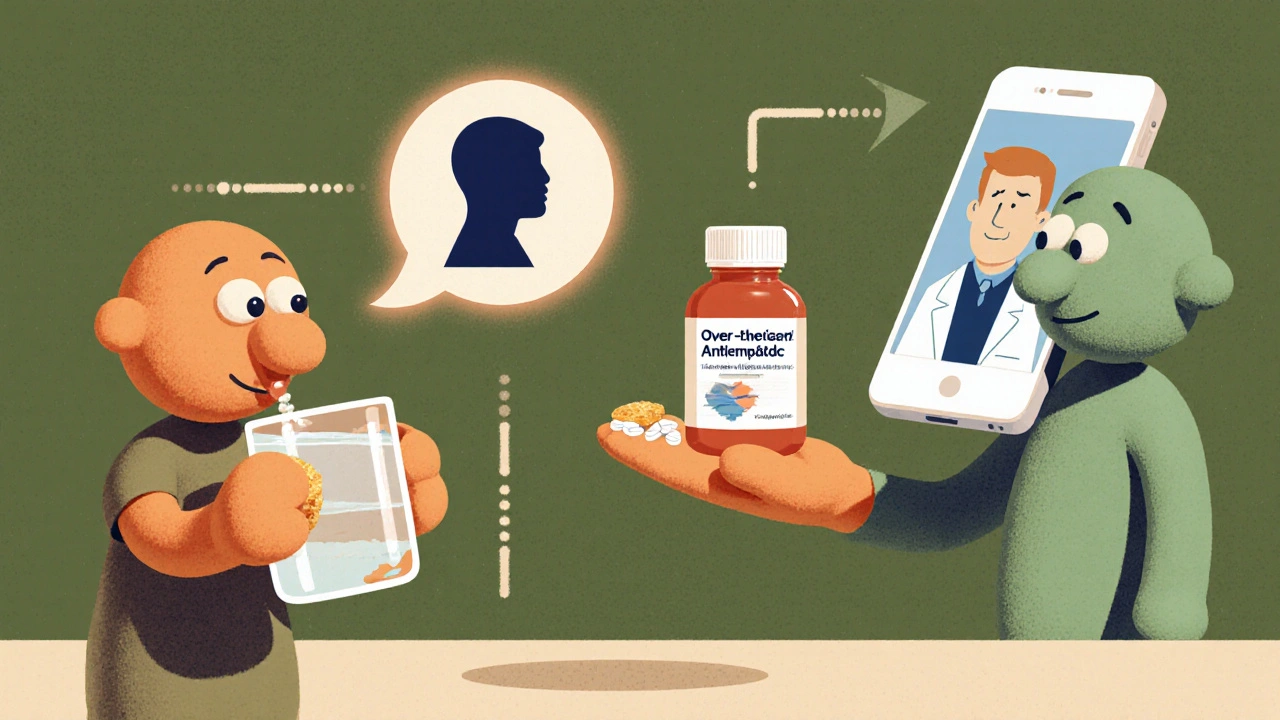Identifying & Managing Medication-Induced Vomiting: A Practical Guide

Oct, 22 2025
Medication Vomiting Checker
Check if your vomiting is medication-induced
High-Risk Medications
Medications most commonly associated with vomiting include:
Antibiotics
Erythromycin, doxycycline, metronidazole
Onset: 30 mins - 2 hours
Mechanism: Gastric mucosal irritation
Opioids
Oxycodone, morphine
Onset: 1-3 hours
Mechanism: Delayed gastric emptying
Chemotherapy
Cisplatin, cyclophosphamide
Onset: Minutes to 3 days
Mechanism: Stimulates chemoreceptor trigger zone
NSAIDs
Ibuprofen, naproxen
Onset: 30 mins - 1 hour
Mechanism: Prostaglandin inhibition → gastric irritation
SSRIs
Sertraline
Onset: 1-4 hours
Mechanism: Serotonin excess (possible serotonin syndrome)
Quick Takeaways
- Medication‑induced vomiting often appears within 30 minutes to 2 hours after a dose.
- Hydration, timing the dose with food, and over‑the‑counter antiemetics are first‑line fixes.
- Red‑flag symptoms-persistent vomiting, blood, severe abdominal pain-require urgent medical attention.
- Know the drug classes most likely to upset your stomach and what to do before you start them.
- Never stop a prescribed drug without consulting a health professional.
What is Medication‑Induced Vomiting?
When a medicine triggers the stomach to contract and force its contents upward, we call it Medication‑induced vomiting, a type of adverse drug reaction that manifests as nausea and the act of vomiting. The body can react for many reasons: the drug irritates the gastric lining, it stimulates the brain’s chemoreceptor trigger zone, or it interferes with normal gut motility. Understanding why this happens is the first step toward stopping it.
Common Drug Culprits
Not all medicines are equal when it comes to upsetting your stomach. Below are the drug families that show up most often in clinical reports of vomiting.
- Antibiotics - especially erythromycin, doxycycline, and metronidazole, which can irritate the gut lining.
- Opioids - drugs like oxycodone and morphine slow gastric emptying, leading to nausea.
- Chemotherapy agents - cisplatin and cyclophosphamide are notorious for triggering the vomiting centre in the brain.
- Non‑steroidal anti‑inflammatory drugs (NSAIDs) - ibuprofen and naproxen can cause gastric irritation.
- Antidepressants - selective serotonin reuptake inhibitors (SSRIs) sometimes lead to serotonin syndrome, a condition that includes vomiting.

How to Tell If Your Vomiting Is a Side Effect
Distinguishing drug‑related vomiting from other causes (like a stomach virus) hinges on timing, dosage, and pattern.
- Onset after the dose: If you feel queasy or vomit within minutes to a few hours after taking a medication, it’s likely a side effect.
- Repetition: The symptom repeats each time you start a new prescription or increase the dose.
- Associated symptoms: Look for a metallic taste, dizziness, or headache that often accompany drug reactions.
- Exclusion of other triggers: Rule out recent food poisoning, alcohol excess, or stress‑related nausea.
Keeping a simple log-date, time, medication, dose, and symptoms-helps your clinician pinpoint the culprit quickly.
Step‑by‑Step Management Plan
Once you suspect a medication is the cause, follow this practical sequence.
- Stay hydrated: Sip clear fluids (water, oral rehydration solution) every 15 minutes. Dehydration worsens nausea.
- Adjust timing: Take the medicine with a small snack or a full meal if the label permits. Food can buffer gastric irritation.
- Consider dose splitting: Some drugs cause fewer symptoms when divided into smaller, more frequent doses.
- Use over‑the‑counter antiemetics: Products containing diphenhydramine or meclizine can provide short‑term relief. vomiting side effects often subside after the first 24‑48 hours of treatment.
- Consult your prescriber: Ask whether a lower dose, an alternative drug, or a prescription antiemetic (e.g., ondansetron) is appropriate.
- Monitor for improvement: If symptoms persist beyond a week or worsen, seek medical review.
When to Seek Immediate Medical Help
Most medication‑related vomiting is benign, but certain signs demand urgent attention.
- Persistent vomiting for more than 24 hours.
- Blood or coffee‑ground material in the vomit.
- Severe abdominal pain, fever, or confusion.
- Signs of dehydration: dizziness, dry mouth, scant urine.
- Sudden onset of chest pain or shortness of breath (possible allergic reaction).
Call emergency services or head to the nearest ED if any of these appear.

Preventive Strategies for Future Prescriptions
Prevention is smarter than cure. Here are habits to minimize risk.
- Read the medication leaflet carefully-look for sections titled “Nausea” or “Gastrointestinal side effects.”
- Ask your pharmacist about taking the drug with food, water, or an antacid.
- If you’re starting a high‑risk drug (e.g., chemotherapy), discuss prophylactic antiemetic plans beforehand.
- Stay on a regular schedule; erratic dosing can confuse the body’s rhythm.
- Maintain a balanced diet rich in ginger, peppermint, or plain crackers, which are gentle on the stomach.
Comparison of High‑Risk Medications
| Medication Class | Example | Typical Onset | Primary Mechanism | First‑Line Management |
|---|---|---|---|---|
| Antibiotics | Erythromycin | 30 min - 2 h | Gastric mucosal irritation | Take with food, add famotidine if needed |
| Opioids | Oxycodone | 1 h - 3 h | Delayed gastric emptying | Divide dose, add ondansetron |
| Chemotherapy | Cisplatin | Within minutes (acute) or 2‑3 days (delayed) | Stimulates chemoreceptor trigger zone | Prophylactic ondansetron + dexamethasone |
| NSAIDs | Ibuprofen | 30 min - 1 h | Prostaglandin inhibition → gastric irritation | Take with meals, consider proton‑pump inhibitor |
| SSRIs | Sertraline | 1 h - 4 h | Serotonin excess (possible serotonin syndrome) | Slow titration, monitor for other signs, use ondansetron if needed |
Frequently Asked Questions
Why does my prescription cause vomiting but my over‑the‑counter meds don’t?
Prescription drugs often act on stronger pathways or higher dosages, which can stimulate the brain’s vomiting centre or irritate the stomach more than low‑dose OTC pills. The chemical structure also matters-some molecules are inherently more emetogenic.
Can I take anti‑nausea medicine without a doctor’s prescription?
Yes, many antiemetics like dimenhydrinate or meclizine are available OTC. However, if vomiting persists, a doctor may need to prescribe stronger agents such as ondansetron, which are not sold over the counter.
Is it safe to stop a medication that makes me vomit?
Never stop abruptly without consulting your prescriber. Stopping suddenly can cause withdrawal, loss of therapeutic effect, or a rebound of the condition being treated. Your doctor can taper the dose or swap for a gentler alternative.
What home remedies actually help with medication‑induced vomiting?
Ginger tea, plain crackers, and peppermint lozenges can calm the stomach. Small, frequent sips of clear fluids prevent dehydration. Avoid strong odors and heavy meals for the first few hours after taking the drug.
When should I alert my pharmacist about vomiting?
If vomiting starts after the first dose, interferes with taking the medication, or continues for more than 24 hours, call your pharmacist. They can suggest dose adjustments, alternative brands, or an OTC anti‑nausea product.
